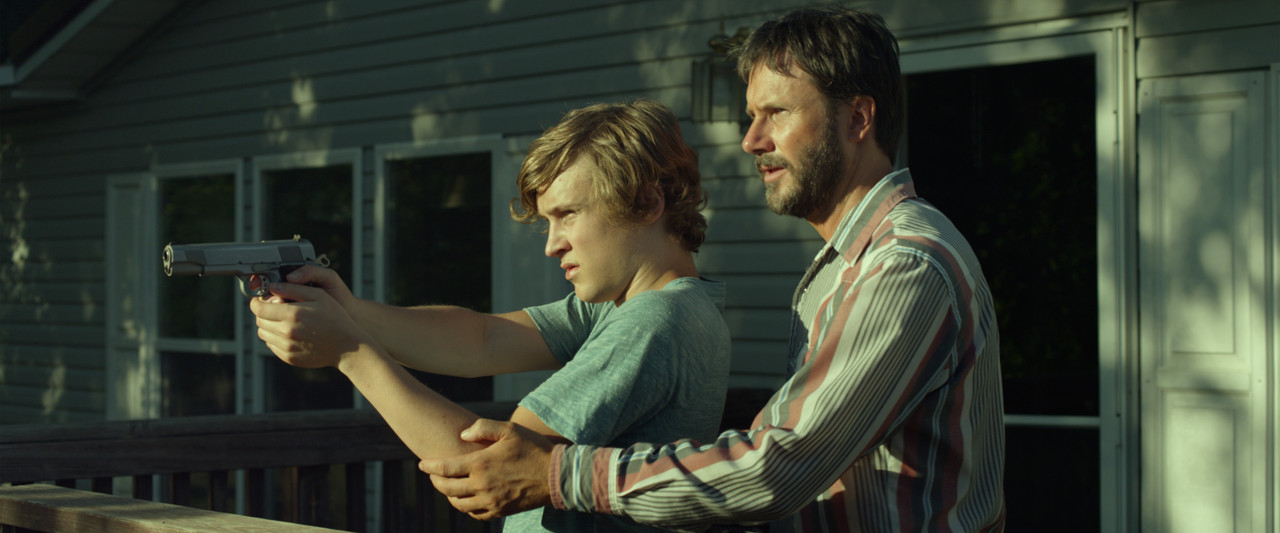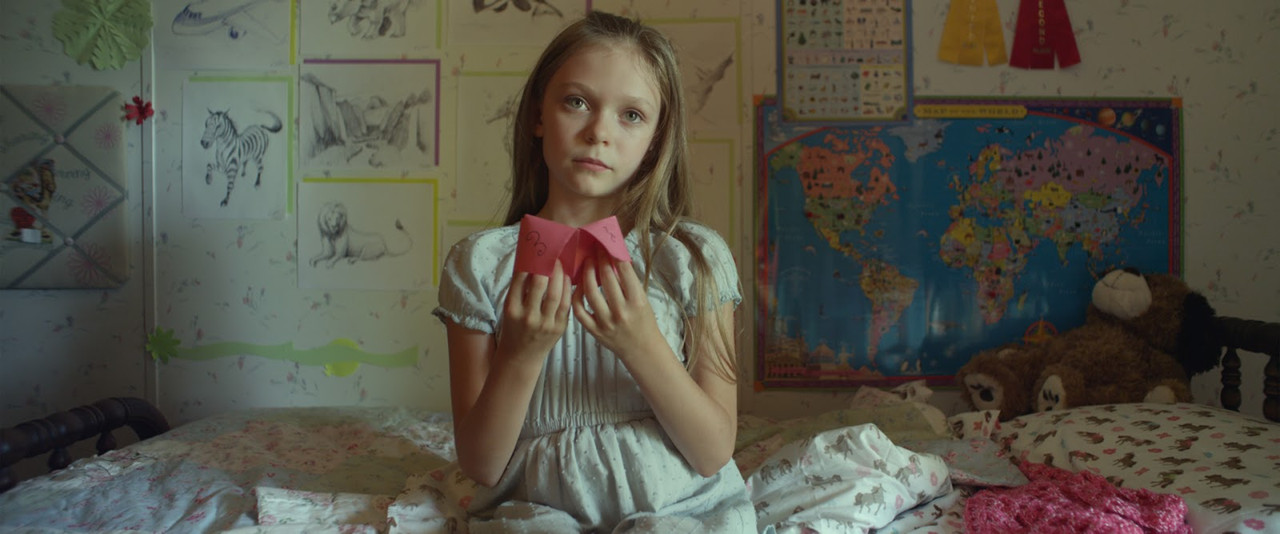Dir: Matt Sobel
Coming of age cinema certainly has its clichés, but for me, the genre remains interesting because there are as many stories to tell, as many different approaches to take, as there are people telling them. Everyone's experience of these pivotal moments is different, and so stories about them will always be worth telling. Take Me to the River strikes a rather different tone to many American coming of age films, even those that skew a little darker than the American Pies of the world, introducing a note of palpable dread that grows from an uncomfortable and uncertain situation.
Ryder (Logan Miller) and his parents (Robin Weigert and Richard Schiff) are going to Nebraska for their annual family reunion, on the journey they decide that it's not a good idea to tell this branch of the family that Ryder is gay. As soon as they arrive, Ryder's young cousins are hanging on him, in particular 9-year-old Molly (Ursula Parker), who insists that he be the one to go with her on a walk to the barn on the property. Minutes later, Molly runs from the barn, screaming, making many in the family suspicious that Ryder has done something to her. The next day, Ryder is asked to lunch at his Uncle Keith's (Josh Hamilton) house, where the atmosphere is uncomfortable at best.
Take Me to the River has an odd atmosphere almost from the start. Even before we see Molly running and screaming from the barn (we never see all of what happens in there), her interactions with Ryder feel precocious and somewhat inappropriate. It's clear that she has a crush on him and that there's a little attempted manipulation going on, though it's never anything especially atypical for a kid her age; there's an innocence mixed with an awareness, but perhaps a lack of understanding, of how older kids and adults act.
In the immediate aftermath of Molly running from the barn, writer/director Matt Sobel uses space, both visual and audio, brilliantly to convey the sense of confusion and chaos that this unexpected interruption to the day has caused. The handheld camera sets things off kilter just enough, and captures many conversations in the background of shots, documenting all kinds of concerns from Keith's angry worry about what has happened to his daughter to Ryder's under the surface panic about what people must think he did. There is an interesting and anxious dynamic to this scene because from what we do see of what happens in the barn (all of which is innocuous), we know that when he relates it, Ryder leaves certain details out.
Whatever happened in the barn, the reaction to this event seems to throw an already uncomfortable reunion (it's clear in the opening scene that neither Ryder nor his parents are exactly keen on going) further out of line, making everyone begin to act differently. Ryder's mother seems to regress, becoming more Nebraskan, something her son notes with evident disdain, but it's Keith whose change of mood seems most unsettling.
The invitation to lunch is immediately strange, especially as it's delivered, on horseback, by Molly's older sister, but it's when Ryder arrives that things really get tense. We can buy in to Keith's lashing out in rage on the previous day, but his forced calm, his fixed smile and outwardly welcoming tone take on a deep seated menace. Josh Hamilton's performance here, as with many others in the film, is a masterclass in keeping things just out of view. Hamilton plays this especially well in the lunch scene. He throws both Ryder and us off balance when he asks him to guess which of his four daughters is the eldest. What answer he is after, and why, remains elusive, but the mere question and Ryder's evident nerves in addressing it imply a lot, little of it good.
The scenes at the river are where things begin to come to a head, they contain some of the best work in the film. As Ryder, Logan Miller seems to drift through the film, sent from one uncomfortable situation to the next with little control and increasing unease over what is going on, it's something of an inherently passive role, but Miller still manages to bring a lot of personality to it, largely through his growing frustration at participating in what seems to be a familial culture of secrets. At the river, Ryder is supposed to be the adult, but there is never any doubt that it is the precocious Molly who is in charge.
For all the quality work done by the rest of the cast, Ursula Parker steals the second half of this film, giving an incredibly assured performance. Parker subtly shifts the dynamic of her performance throughout, she seems sullen at the scene at the lunch table but starts to warm up to Ryder again when Keith suggests that she show him a trophy she won. The dynamic changes again as she leads Ryder to the river and we're left to wonder how much of what she's doing was whispered to her by Keith and how much is of her own design.
One moment in the river sequence is likely to divide audiences and to be very controversial, what Molly calls 'chickenfighting' is depicted with a frankness unusual in American coming of age cinema, and it is a deeply unsettling moment, both for us and for Ryder, and one which throws up the central disturbing questions of the film's final scenes. Only once does the river sequence make a misstep. Given all that has happened, it rather strains credulity that Ryder doesn't figure what is going to happen when Molly tells him to close his eyes and count to 50. The character seems smarter than that.
As Josephine Decker did with Thou Wast Mild and Lovely, a film that Take Me to the River also recalls in a visual sense, Matt Sobel leaves us to sit with our questions about just how unusual the relationships in this family might have been (or still be). He never plunges completely into the darkness that the film suggests, instead leaving us with the impression that these secrets could be sitting under the surface in just about any home, and that while we may run from them, sometimes they come back to haunt us.
This is a confident début from Sobel, achieving a tricky tonal balance (he blows it only with a final song choice that is laughably on the nose) and pulling a long thread of suspense from events that could seem entirely innocuous. I'll be intrigued to see where he goes next.
★★★★
★★★★



No comments:
Post a Comment